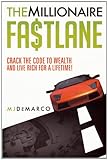 I'm a compulsive reader. The missus will often call up the stairs and ask what I'm what I'm up to and then sigh at the answer: "I'm reading".
I'm a compulsive reader. The missus will often call up the stairs and ask what I'm what I'm up to and then sigh at the answer: "I'm reading". The trouble is that after a while some of the books blur into one. Was that killer quote in that book or this one? And that brilliant idea - where exactly was it again?
Perhaps I am just getting old and forgetful.
Anyhow I recently read something very useful. If you want to remember, you need to take action on the thing you read. And right next to it was another cool piece of advice - blogging about the key ideas in the book is a great way of installing (yep another computer analogy) the key ideas into your mind.
This is all just a roundabout way of explaining the reason for writing this blog post. The other reason is that MJ DeMarco has written an excellent book which deserves your reading consideration.
The Millionaire Fastlane
The author is obsessed with fast cars - Lamborghinis in particular. Not the obvious choice for a diehard cyclist like myself but I'd heard a lot of good things so thought I'd persevere. He uses this enthusiasm for fast cars and driving to tell the choices you can make in life about becoming wealthy:
Sidewalk
Basically credit junkies who spend everything they earn (and more). They hope the lottery will make them rich.
Slowlane
Save 10% of your paycheck, take up a pension, be an employee. If you are lucky, you'll retire somewhat wealthy.Fastlane
Create a business but make sure it has a large potential market (or a small one willing to pay a lot), isn't dependent on you (or ideally any other human resource). Then look to sell for a mint and live off the invested income.
Finally, he spends a bit of time giving Tim Ferris of the Four Hour Work Week some friendly cuffing. He slams Tim on customer service in particular. This is a shame and not entirely justified. The Four hour work week is actually good on this as Tim gets his customer care team to work to particular rules and says they can spend several times the cost of the product to resolve unforeseen problems using their own initiative. I suspect in real life, Tim and MJ would actually get on like a house on fire - their style and material is highly complementary.
The book is quite a slow burner but a compellingly enthusiastic and fairly fluff-free read. You really do get the impression he has actually lived this (which is not that surprising as he did have a very successful internet based limo business which he started from scratch).
He is very mathematically minded and the book is sprinkled with formula so beware if maths is a weakness. If shouldn't stop you reading, but you could find your attention wandering...to that interesting piece of wall right over there.
But it's not until the later half that he starts to tell you the things he thinks you should focus on:
- Superb customer service.
- Working out what you can excel at (ie a USP).
- Meeting people's needs with your product or service.
- Creating a brand rather than a business.
- Focusing on benefits rather than features.
- One business - not many.
- Time. You can always earn more money, you can't get more time.
- The income you need. Very similar to dreamlining in Four Hour Work Week - but much more in-depth.
- Repeating or replicating success.
No comments:
Post a Comment